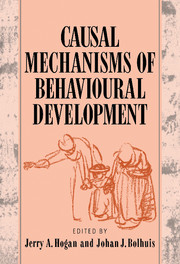Book contents
- Frontmatter
- Contents
- List of contributors
- Foreword: Introducing Jaap Kruijt
- Preface
- Part one Introduction
- 1 The concept of cause in the study of behavior
- 2 Neurobiological analyses of behavioural mechanisms in development
- Part two Development of perceptual and motor mechanisms
- Part three Development of behaviour systems
- Part four Development of cognition
- Part five Learning and development
- Author index
- Subject index
1 - The concept of cause in the study of behavior
Published online by Cambridge University Press: 19 January 2010
- Frontmatter
- Contents
- List of contributors
- Foreword: Introducing Jaap Kruijt
- Preface
- Part one Introduction
- 1 The concept of cause in the study of behavior
- 2 Neurobiological analyses of behavioural mechanisms in development
- Part two Development of perceptual and motor mechanisms
- Part three Development of behaviour systems
- Part four Development of cognition
- Part five Learning and development
- Author index
- Subject index
Summary
The title of this book, Causal Mechanisms of Behavioural Development, comprises four substantive words, all of which are relatively common in English. They are words that most speakers of the language, and certainly most scientists, would probably say they know the meaning of. Yet all four can be misleading for that very reason; all of these words are used in many different ways, and few people are actually aware of these differences. At the risk of seeming pedantic, I shall devote the first few pages of this book to a discussion of some distinctions that should make clear how we are using these words. Some of this discussion will tend to the philosophical, but I trust that most readers will find it useful for putting the subsequent chapters into a general perspective. I shall take each word in turn.
Cause
In his well-known article ‘On aims and methods of ethology’, Tinbergen (1963) stated that there are four kinds of questions one can ask about biological phenomena: causation, survival value, ontogeny, and evolution. These distinctions are important, and have had a great influence on students of animal behavior. However, as I have pointed out elsewhere (Hogan, 1984), these questions do not cover all the important aspects of behavior. A more general classification of questions can be derived from some distinctions made originally by Aristotle.
In discussing physics and metaphysics, Aristotle pointed out that one and the same thing could be described or explained in four different ways.
- Type
- Chapter
- Information
- Causal Mechanisms of Behavioural Development , pp. 3 - 15Publisher: Cambridge University PressPrint publication year: 1994
- 16
- Cited by

